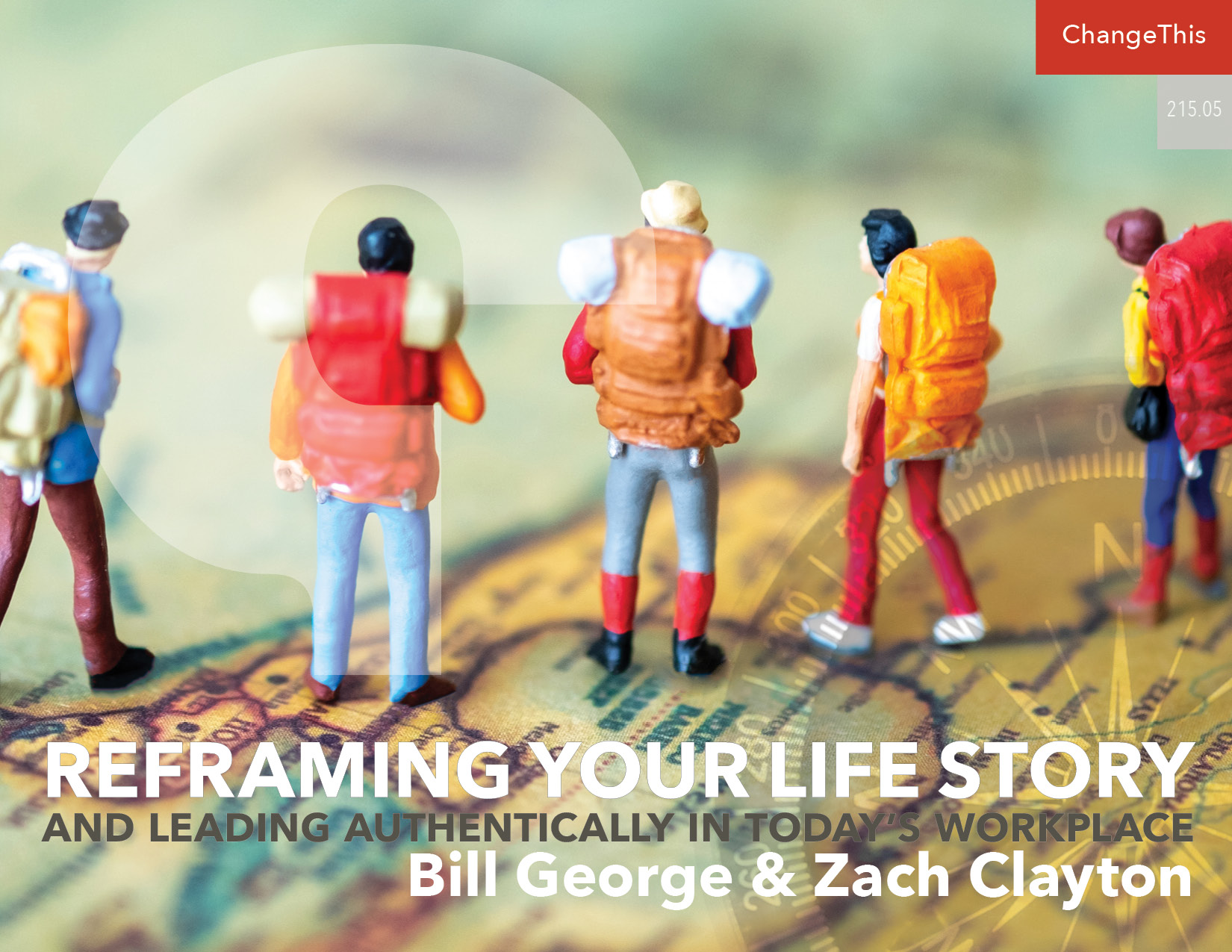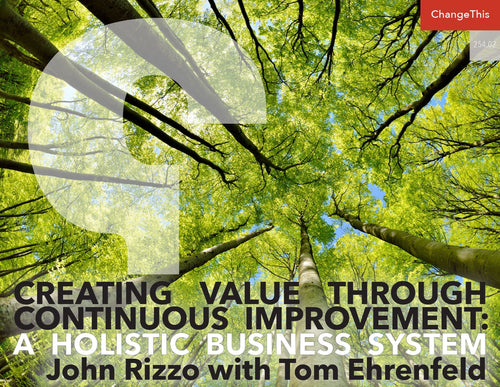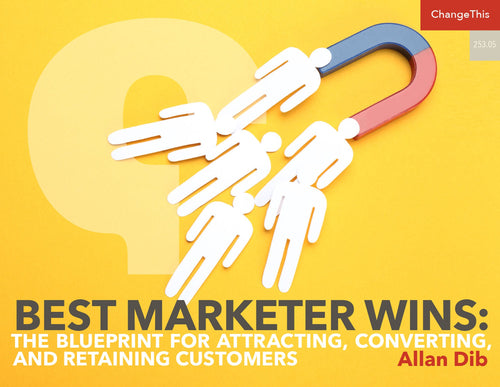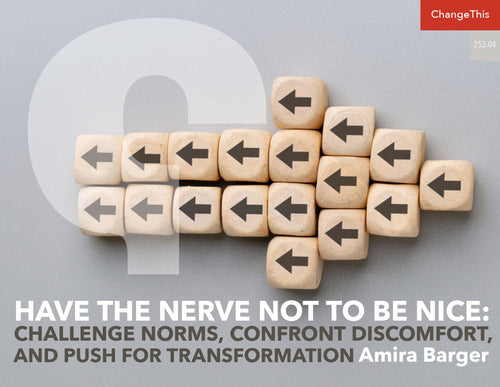Reframing Your Life Story: And Leading Authentically In Today's Workplace
All great myths pay tribute to the winding journey of the human condition.
For instance, Homer’s Odysseus spends a decade traversing the world before he comes to know himself. Though each journey is unique, the patterns are similar. Life involves suffering and hardship. We learn as we struggle and stumble along the way. Through these encounters, our character is formed. We gain wisdom, and we find clues about how we can fulfill our purpose in the world. As former secretary of health and human services John Gardner once said, “I guess I had certain leadership qualities that life was just waiting to pull out of me.”
The journey to authentic leadership begins with understanding yourself: your life stories and crucibles. The life stories of the 222 leaders we interviewed in The Emerging Leaders Edition of True North cover the full spectrum of experiences, including the impact of parents, teachers, coaches, and mentors; support of their communities; and leadership in team sports, scouting, student government, and early employment. Many leaders were influenced by difficult experiences, such as personal illness or illness of a family member; death of a loved one; or being discriminated against by peers.
These leaders found their passion to lead through their unique life stories:
- None were born as leaders.
- None had innate characteristics, traits, or styles of a leader.
- None succeeded by emulating other leaders.
Rather, by being their authentic selves, they became great leaders, using their gifts to help others. This could happen only if they first understood themselves and their life stories.
Have you examined what leadership qualities life wants to pull out of you? As you read the following stories, think about the ways your life story inspires you and defines your leadership.
KABIR BARDAY: A PHOENIX ARISES FROM A HOSPITAL BED
Kabir Barday’s parents immigrated from India to Atlanta, Georgia, before he was born. Despite facing harassment and discrimination after 9/11, they believed in the American Dream and instilled it in Kabir. Indeed, the feeling of a destiny of greatness burned so strong in him that Kabir, a brilliant student, was surprised when Stanford University and Massachusetts Institute of Technology (MIT) rejected his college applications. Upon graduating from Georgia Institute of Technology (Georgia Tech), he faced additional rejections when Google and Facebook passed over his job applications. “I was very used to getting exactly what I wanted,” he says. “That feeling of rejection was unfamiliar to me.”
At first, this rejection inspired Kabir to work intensely, perhaps too much so. After working several years as a software consultant, Kabir founded OneTrust, an enterprise software platform that helps companies do good for people and the planet by managing privacy, ethics, ESG, and security. To jump-start the business, he flew 500,000 miles a year to meet with customers internationally. Often, the only familiar meals when arriving late evening in an unfamiliar city would be Starbucks and McDonald’s. Kabir saw his fiancée just about 30 days that first year. He says, “I alienated my friends and personal relationships. I didn’t show up at two of my closest friends’ bachelor parties or weddings.”
On Thanksgiving, Kabir traveled to London to keep working because the British did not celebrate the holiday. While in London, Kabir spent an evening lying in bed in excruciating pain. The next day he saw a doctor who told him, “Your lymph nodes are fully inflamed, which usually means cancer.” The doctor recommended immediately checking into a hospital, but instead Kabir traveled to Brussels for his next meeting. Arriving in Brussels, he faced overwhelming pain and was forced to find a hospital in the middle of the night. Kabir ultimately spent two months at the Mayo Clinic where, given the complexity and severity of his symptoms, even after 300 tests, doctors could not precisely diagnose his issue. The prognosis seemed grim, as he had no platelets in his blood with extremely low hemoglobin and received blood transfusions almost daily. Against all odds, he began to improve.
The doctors still don’t know what it was, but they suspect an autoimmune related issue. For a few years following the initial hospitalization, a number of additional auto-immune related issues would surface and remind me your health is something that needs to be constantly respected.
Kabir’s crucible could have been devastating, but instead it cracked him open to a new phase in his life.
Today, he meditates to reduce stress and cherishes spending time with his wife and children. “What no medical practice has mastered,” he says, “is the connection between stress, diet, the exposome, and the importance of these things working together. Just like you manage your goals in business, you must manage your well-being.”
This is a dream job and so much fun, but I never admitted the impact of the stress of being switched on all the time. Looking back, was it all worth it? The company flourished and we dominated the market, but at what cost? I was young enough to rebuild those relationships and prioritize those parts of my life, but the ultimate sacrifice was myself.
Kabir’s experiences as a self-described “intense leader” early in his career gave way to a more integrated approach. He learned that “self-forgiveness is the ultimate skill that somebody in my position needs to develop.” His life experience also prepared him to lead through the turbulence of 2020, including the COVID-19 pandemic and racial unrest that gripped the country. He explains,
As brutal as the last 2 years have been, everything has made me a better leader. Going through my own health crisis, I now realize that everyone faces some challenge. Our Black, Latinx, and Asian employees walked me through the experiences they had growing up. Their stories were so powerful that they changed me as a leader.
Today Kabir is achieving even greater success because he is focused on living a more grounded, balanced, and integrated life. Only 6 years old and already valued at more than $5 billion, OneTrust has experienced a staggering 48,337 percent 3-year growth rate and was ranked as the fastest-growing startup in the country by Inc. magazine. Kabir reflects, “The only successful way to run a company today is people first with empathy and authenticity.”
Kabir’s crucible could have been devastating, but instead it cracked him open to a new phase in his life.
ALAN PAGE: CHANGING THE WORLD THROUGH EDUCATION
Most people know Alan Page as one of the best professional football players of all time—a member of the College Football All-America team who led Notre Dame to the 1966 national championship, a Hall of Famer who played in four Super Bowls, and the first defensive player ever named the NFL’s most valuable player. But if that is all you know about Alan, you have missed the amazing human being within.
Alan was born in Canton, Ohio. His father worked at the steel mill, and his mother worked as a club attendant. He and his family faced constant racial discrimination. He observes, “If you were Black, you knew your place. You knew which side of the tracks you belonged on.” In the face of this discrimination, Alan’s parents had one nonnegotiable goal: their children would get a good education.
While still playing pro football, Alan attended law school and joined a local law firm. Later, he was elected to the Minnesota Supreme Court, where he served for 20 years before reaching mandatory retirement at age 70. Fighting the discrimination he had known as a child motivated Alan. He believes in the principle of equal justice under the law for everyone but recognizes we are far from that goal. “Our justice system is grounded in discrimination,” he says.
Go back to our original constitution: Blacks were three-fifths of a person. We fought a civil war over slavery, but we did not end the racial animus connected to slavery. People who died during the civil rights struggle of the ‘50s and ‘60s gave their lives so someone like me could have the opportunity to do the things I’ve done. Whatever I’ve done pales in comparison.
While Alan is known for his football achievements, the greatest lesson he uncovered from interpreting his life story was that education is the best antidote to discrimination—and that his real purpose is to enable everyone to obtain a quality education. In his acceptance speech at the NFL Hall of Fame in Canton, Alan said,
I don’t know when children stop dreaming. I have seen the cloud of resignation as they travel through school without making any progress. They know they are slipping through the net in the huge underclass our society seems willing to tolerate. At first, kids try to conceal their fear with defiance. Then the defiance turns into disregard for our society and its rules. It’s then we have lost them—maybe forever. We can make a difference if we go back into the schools before they’ve given up on the system and before the system gives up on them.
Alan’s passion clearly comes through when he speaks about racial justice or education, but his actions are even more powerful. The Page Education Foundation, which he and his wife, Diane, founded in 1988, has provided college scholarships for 8,000 students, mostly young minorities, many of whom would not have gone to college without financial support. In return for their scholarships, Page Fellows have given back 500,000 hours in volunteer community service, primarily in mentoring young people in secondary schools.
Now Alan is working with Neel Kashkari, president of the Federal Reserve Bank of Minneapolis, to amend the Minnesota state constitution to give every child a civil right to quality public education as opposed to “an adequate education system.” Alan notes, “The most basic rights—voting, freedom of speech, freedom of religion, freedom of the press—are fundamental. We have the chance to be the founding fathers and mothers of the future.”
Alan’s life story is a living testament to what dedicated leaders can achieve when they focus on changing the world through their passion. In 2018, he was awarded the Presidential Medal of Freedom, the nation’s highest civilian honor.
REFRAMING YOUR LIFE STORY
Kabir Barday and Alan Page, and all the other leaders we interviewed, found inspiration to lead through their life stories. By understanding the formative experiences of their early lives, they reframed their life stories to shape their leadership around fulfilling their passions and following their True North
You may be asking, “Doesn’t everyone have a life story? What makes leaders’ stories different?” Many people with painful stories see themselves as victims, feeling the world has dealt them a bad hand. Some get so caught up in chasing the world’s esteem to fill a wound that they never reflect on what they want. Others lack the introspection to connect the dots between their life experiences and the goals they are pursuing, which can lead to repeating their mistakes.
The difference with authentic leaders lies in the way they interpret their life stories. Their stories provide context for their desire to have a positive impact in the world. By reflecting on their stories, leaders understand how important events and interactions with people have shaped their approach to the world. Discerning our stories, and then reframing them as necessary, enables us to recognize that we are not victims but people shaped by experiences that provide the impetus for us to become leaders.
Novelist John Barth once said, “The story of your life is not your life. It is your story.” In other words, it is how you understand yourself through your story that matters, not the facts of your life. You must actively process your life story to gain meaning and inspiration from it.
Can you connect the dots between your past and your future to find your inspiration to lead authentically? What people or experiences have shaped you? What have been the key turning points in your life? How does your past inspire you or hold you back? Where in your story do you find your passion to lead? How can you leverage your gifts and life story to make a difference?
Adapted from True North: Leading Authentically in Today’s Workplace, Emerging Leader Edition.
Copyright © 2022 by William George. All rights reserved.
ABOUT THE AUTHORS
Bill George is the former Chair and CEO of Medtronic and Executive Fellow at Harvard Business School (HBS), where he has taught leadership to MBAs and executives since 2004. He is the author of four bestselling books: Authentic Leadership, True North, Finding Your True North, and 7 Lessons for Leading in Crisis. True North has been recognized as one of the 25 Best Leadership Books of All-Time. He has served on the boards of Goldman Sachs, Mayo Clinic, ExxonMobil, Novartis, and Target.
Zach Clayton is the founder and CEO of Three Ships, which operates digital marketplace businesses. He leads this fast-growing business with several hundred employees while he and his wife raise four children 5 years old and younger.











































